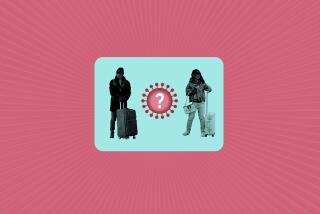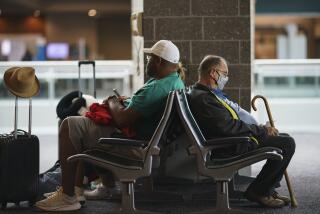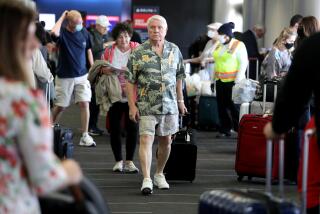A Little Preventive Medicine Can Go Long Way
- Share via
To stay healthy when you travel abroad, divide the world into three regions:
Region I. Good Health Standards: most of Western Europe, Australia, New Zealand, Japan.
Region II. Fair Health Standards: Greece, Spain, Portugal, southern Italy, Eastern Europe, Israel, Singapore, South Africa, the islands of the Caribbean (except Haiti and the Dominican Republic).
Region III. Unreliable Health Standards: Mexico, Central and South America, Africa, most of Asia, Haiti and the Dominican Republic.
Region I. Travel in this area doesn’t require much preparation. The most important thing is to make sure that you are in good health before you begin your journey and that your inoculations are up to date.
You may also want to make sure that your health and accident insurance covers overseas travel and, if you have a chronic condition of any kind, to carry copies of your medical records and prescriptions.
Check with your physician to find out how to adjust medication-taking times to new time zones. Do not change times without his or her advice.
If you like, carry the telephone numbers of your health care professionals at home. Pack a small medical kit, making sure to include any regular medications along with first-aid items.
To find out what, if any, inoculations are necessary, call the Centers for Disease Control in Atlanta (404) 639-2572.
Drink bottled water. Tap water everywhere contains microorganisms that may be sufficiently different from those at home to trigger intestinal upsets.
Consider buying insurance that provides: a 24-hour “hot line” to find English-speaking physicians and hospitals; immediate payment of bills and evacuation, if you become incapacitated. Such service is provided by: International SOS, toll-free (800) 523-8930; Access America, (800) 284-8300; Healthcare Abroad, (800) 237-6615; Travel Assistance International, (800) 821-2828.
If you need to carry your medical records, a company called Medic Alert, P.O. Box 1009, Turlock, Calif. 95381 (800) 344-3226, provides convenient systems for doing so.
Region II. Observe the health precautions of Region I plus the following:
Exercise caution in selecting restaurants. Get recommendations from people familiar with tourist needs and standards. Hotel managers, consular officials and tour guides may be helpful.
Choose cleanliness over culinary adventure. One bad meal can cause illness that will last an entire trip.
Ask your physician whether your destination dictates that you get a shot of gamma globulin to prevent hepatitis.
Never swim in fresh water in the tropics. It may contain organisms that can cause schistosomiasis, a serious illness.
Region III. Observe the health precautions of Region I and II plus the following:
When it comes to meals, deluxe international hotels are the safest places to dine. They are the most likely to have modern refrigeration, purified water and high sanitation standards.
Eat well-cooked foods that are still hot. If food that should be served hot arrives at your table tepid, send it back to the kitchen and demand a new serving. (Reheating will not kill potentially harmful organisms.)
Avoid milk, drinks containing ice cubes, salads and fresh, unpeeled fruit.
Brush your teeth with bottled water.
If traveling in rural or primitive areas, carry eating utensils with you and make sure to wash them carefully after use with bottled water and soap.
Always wash your hands before eating. Carry packaged alcohol towels rather than packaged moist towels, for washing your hands when running water is not available.
Malaria is present in the tropics, in many Third World countries and on some islands of the South Pacific.
To prevent it, weekly chloroquine tablets must be taken for several weeks before departure, throughout the duration of the trip and for several weeks after. But alternate medications may be necessary to avoid some strains that have built up a tolerance to chloroquine. Ask the Centers for Disease Control what medication is recommended.
For a recorded message on malaria, its cause, prevention and treatment, call the Centers for Disease Control (404) 639-1610.
In the tropics, dress in dark-colored clothing and use insect repellent. Repellents containing diethyl-toluamide (DEET) are most effective. Staying indoors at dawn and dusk may help you avoid insect bites that could carry disease.
If traveler’s diarrhea strikes, minimize food intake and drink fluids constantly. Bottled or canned fruit juice and carbonated soft drinks are good choices. Generally, symptoms disappear in a day or two.
Over-the-counter medications that reduce the severity and duration of diarrhea are: Bismuth subsalicylate (Pepto-Bismol) and Loperamide (Imodium).
More to Read
Sign up for The Wild
We’ll help you find the best places to hike, bike and run, as well as the perfect silent spots for meditation and yoga.
You may occasionally receive promotional content from the Los Angeles Times.






